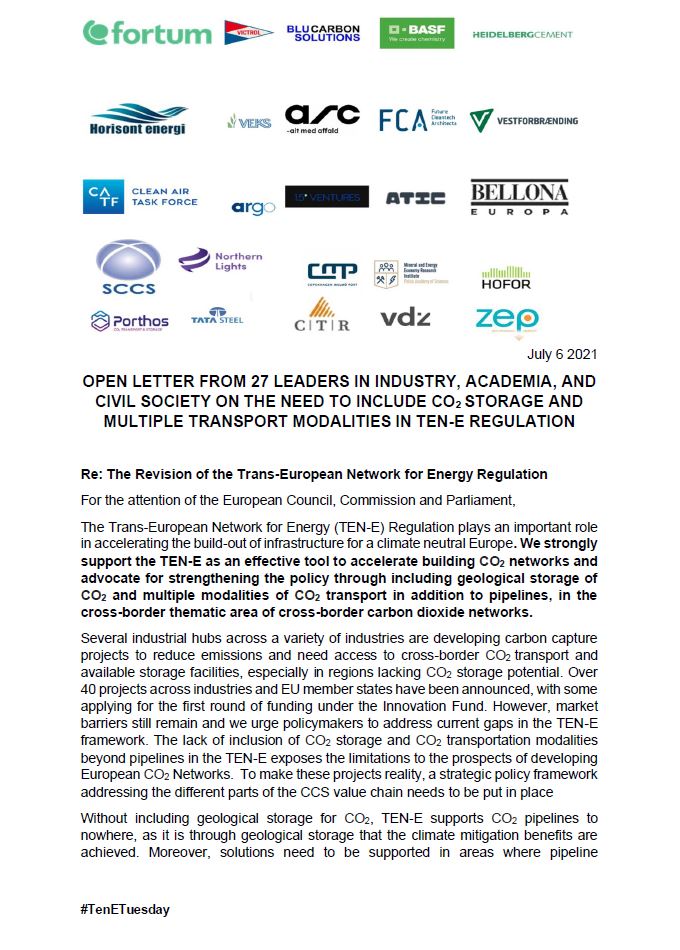
Working to discern patterns of environmental disinformation in an online world
For the past eight years, disinformation has dominated news around elections all over the world. Despite this, it is still a widely misunderstood con...
News

Publish date: January 6, 2021
News
On Tuesday, July 6th, Bellona Europa, alongside Clean Air Taskforce, issued a letter from leaders in industry, academia and civil society calling for the inclusion of CO2 storage and multiple transport modalities in the TEN-E Regulation.
The open letter was signed by 27 leaders in industry, academia and civil society, urging policymakers to address current gaps in the TEN-E framework. The lack of inclusion of CO2 storage & CO2 transportation modalities beyond pipelines in the TEN-E exposes the limitations to the prospects of developing European CO2 Networks.
Please read the open letter below:
For the attention of the European Council, Commission and Parliament,
The Trans-European Network for Energy (TEN-E) Regulation plays an important role in accelerating the build-out of infrastructure for a climate neutral Europe. We strongly support the TEN-E as an effective tool to accelerate building CO2 networks and advocate for strengthening the policy through including geological storage of CO2 and multiple modalities of CO2 transport in addition to pipelines, in the cross-border thematic area of cross-border carbon dioxide networks.
Several industrial hubs across a variety of industries are developing carbon capture projects to reduce emissions and need access to cross-border CO2 transport and available storage facilities, especially in regions lacking CO2 storage potential. Over 40 projects across industries and EU member states have been announced, with some applying for the first round of funding under the Innovation Fund. However, market barriers still remain and we urge policymakers to address current gaps in the TEN-E framework. The lack of inclusion of CO2 storage and CO2 transportation modalities beyond pipelines in the TEN-E exposes the limitations to the prospects of developing European CO2 Networks. To make these projects reality, a strategic policy framework addressing the different parts of the CCS value chain needs to be put in place Without including geological storage for CO2, TEN-E supports CO2 pipelines to nowhere, as it is through geological storage that the climate mitigation benefits are achieved. Moreover, solutions need to be supported in areas where pipeline construction is unfeasible, and this includes other CO2 transport modalities, such as rail, ship, barge, and truck. We urge policy makers to optimize the cross-border carbon dioxide networks thematic area of TEN-E by including CO2 transport modalities and geological storage of CO2.
A revised TEN-E will enable the construction of tomorrow’s infrastructure for climate neutrality by signalling strong policy support for the essential role of carbon capture and storage. Policy makers and industry must work together to adapt our systems for cooperation around the capture and storage of CO2 from European industrial activities and the atmosphere to succeed in reaching net- zero emissions by mid-century. If the incoherence between TEN-E and the objectives set out in the European Green Deal is not addressed, this could lead to distrust in the ongoing process and the EU’s chances and dedication to reaching its climate targets.
Yours faithfully,

For the past eight years, disinformation has dominated news around elections all over the world. Despite this, it is still a widely misunderstood con...

A ruling by the European Free Trade Association Court that Norway’s continental shelf falls under the European Economic Area Agreement could dramatic...

Bellona held a seminar on countering Russian disinformation in the Arctic at the Arctic Frontiers international conference in Norway

Our December Nuclear Digest, reported by Bellona’s Environmental Transparency Center, is out now. Here’s a quick taste of three nuclear issues arisin...